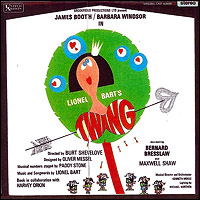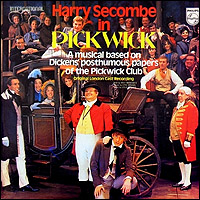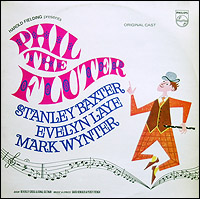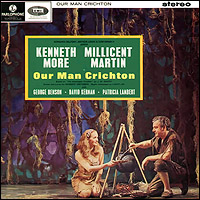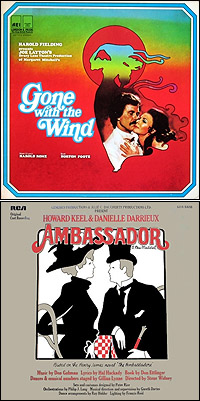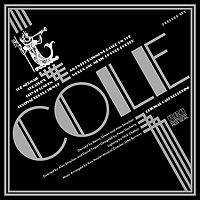*
Compiling a list of British cast albums that I would like to see transferred to CD is somewhat more problematic than a corresponding list of Broadway LPs (as in our prior column, linked here) or Off-Broadway ones (in our next column).
My knowledge of eligible British cast albums is limited by those I happened to have had the opportunity to hear. In the days before the advent of the CD, relatively few British cast albums were imported to the United States, and vice versa. If you went overseas you might return with a handful of new LPs; otherwise, you only got what turned up. Thus I preface this list by saying that there are unquestionably not-yet-on-CD U.K. items that I can't recommend because I never heard them. (The British labels Sepia and Must Close Saturday have brought us a fair number of pre-1970 West End musicals which I now listen to regularly, but might otherwise have never heard of. So I suppose there must be more of the same.) Hence, my list is somewhat restricted. The titles that have made it, oddly enough, all seem to fall in one category: tuneful-and-peppy musical comedies seemingly concerned with little more than providing their audiences with amusement. None of the shows were distinguished, perhaps, but all make for enjoyable listening. To me, at least.
*
On the very day that I started college, I got a job ushering at The Me Nobody Knows at the Orpheum Theatre in the heart of the East Village. Thus it was that during the first act of a Sunday matinee in October 1970, I found a strange, gnome-like man sitting on the stairs in the lobby, crying. He looked odd — and East Villagey enough — to be a wanderer off the streets, but he had a strange theatrical sensibility. Is something wrong? I asked. "No," he said, "It's just that the music is so beautiful." Maybe he'd like to go back in? I asked. No, later said he. Maybe he wanted a cup of water? No, he'd be fine. And he told me he had just flown in for meetings. He was writing a musical. Sure, I thought; everybody is writing a musical. Yes, he said, based on "Gulliver's Travels." Now, a musical based on "Gulliver's Travels" seems pretty suspect; but even at 17 I read Variety, and remembered a recent item about this unlikely sounding (and ultimately unwritten) musical by Lionel Bart. Here — sitting on the steps of the Orpheum, crying — was the amazing Lionel, who had galvanized the British musical theatre in 1960 with Oliver! Yes, he was a pretty strange bird; in my youthful innocence, I didn't comprehend that his enthusiastic but disconnected and disheveled state was probably brought on not only by beautiful music but chemical interference. At any rate, I went off to do something or other and when I returned Bart was gone.
Even so, as I discovered more of Bart's work, I became a dedicated fan. He wasn't the most sophisticated of songwriters, no; but he had a common touch and the ability to come up with tunes that grab you. Bart followed
Oliver! with
Blitz! and
Maggie May, two hits that understandably paled in comparison to his earlier worldwide juggernaut. By 1965, the combination of world-wide acclaim, millions of pounds pouring in from all sides, and severe emotional problems — mixed with unlimited alcohol and drugs — collided and more or less exploded Bart's world. This was hastened by a musical called
Twang!! [United Artists SOLP 1116], a modern-style and merry (?) retelling of the Robin Hood story. The show was not only a failure, quickly laughed off the London stage, it was Bart's Waterloo; when financing dried up, he undertook to pay the bills and keep it going. Rather than taking out a loan or two, he apparently signed away his future royalties to his prior hits. The man was not a businessman, for sure. Anyway, the
Twang!! debacle left Bart in dire shape financially, emotionally, and physically; he never did recover from the one-two-three punch. I suppose that if I had seen
Twang!!, I might find the cast album intolerable. But I didn't, and I don't, and I resultingly nominate said LP to my little list. Bart's aforementioned common touch and ability to grab you is very much in evidence. The album starts off with a rollickingly bouncy "Welcome to Sherwood Forest," continues with an irrepressible song about chastity belts, and goes on from there. There are two tender songs, "Wander" and "Dreamchild"; a decidedly wretched item called "Roger the Ugly"; and a frenetically wild title song which is hard to resist. Best, for me, is a knockout production number called "With Bells On," which equates to Sandy Wilson's "Big Best Shoes" from
Valmouth (the original cast album of which doesn't make our list only because it was released by DRG some years back, although presently out-of-print).
Twang!! was undoubtedly a mess, and an irredeemable one at that; but the cast album, which I suppose might have sent Bart even further into hock, makes for joyous listening. As long as it doesn't bring up memories of sitting through what must have been a very trying shambles.
*
The aforementioned
Oliver!, from a novel by Mr. Dickens, revolutionized the musical theatre world. Broadway producer David Merrick got the U.S. rights, put together a pre-sold pre-Broadway tour which guaranteed a financial profit, and eventually took Broadway by storm when the show opened at the Imperial Theatre. The director (Peter Coe) and designer (Sean Kelly) of
Oliver!, in the meanwhile, quickly turned to another Dickens tome for
Pickwick [Philips 6382070]. With Bart otherwise engaged, they enlisted composer Cyril Ornadel and lyricist Leslie Bricusse for the show, building it to order around the balloon-shaped high tenor Harry Secombe.
Pickwick was a major West End hit, although not of the same proportions as
Oliver!. (While the stars of
Oliver! were easily replaceable, the one-of-a-kind Secombe was not.) Merrick arranged the same sort of cash-guaranteed extended pre-Broadway tour, but something went very wrong on the way to the 46th Street.
Pickwick fizzled on the road despite strong business; innumerable changes crept into the show, with doctoring by assorted hands, and the version that arrived in New York was a deflated rendition of the London hit. The show soon closed, tarnishing its reputation forever. (An interesting account of the battle between Secombe and Merrick, centering on the star's case of mumps, can be found in my book "Second Act Trouble.") Secombe revived
Pickwick at Chichester in 1993, and that cast album was released on CD; but the original 1963 London cast album, for reasons unknown, remains on the LP-only list. And it's a grand album. The show's one song hit — "If I Ruled the World" — is there in all its glory, yes; and there's a worthy runner up in the ballad "There's Something About You." But the score is loaded with some ever-so-charming numbers; "That's What I Want for Christmas" alone will light up anyone's gray Monday. What's more, Teddy Green (known on Broadway as the sparkplug of
Baker Street and
Darling of the Day) almost succeeds in stealing the limelight from Secombe with a trio of delectable turns, "Talk," "You Never Met a Fellow Like Me," and "Every Day You Learn a Little Something." The Chichester recording [That's Entertainment TER 1205] is fine enough, with a grandfatherly Secombe and Roy Castle (of the Broadway cast) singing Teddy Green's numbers with some strangely altered arrangements, but the CD doesn't compare to the delectable 1963 LP.
*
When I was assigned in 1999 to write liner notes for the CD release of
Half a Sixpence, all I knew about David Heneker was (a) he wrote the songs, some of them very catchy, for the musical in question; (b) he followed the 1963
Sixpence with
Charlie Girl, which was at one point the sixth longest running musical in West End history — with 2,202 performances — despite the fact that nobody much seemed to like it except the customers; and (c), he was one of the trio of Englishmen who did the English-language translation of
Irma La Douce, a musical that I like a lot. Researching the career of Mr. Heneker, I found that he came to the theatre after 23 years in the army, rising to the rank of colonel in India; that he was a frequent contributor to the West End scene; and that he was just turning 93. Over the years I have sought out other scores of his and found that his work is typically chockfull of friendly, tuneful songs. My favorite of the Heneker LPs I've heard that are still not on CD is the 1969
Phil the Fluter [Philips SBL 7916]. This is a rather unusual piece, in that it more or less follows the early career of Irish songwriter/performer Percy French (1854-1920). What's more, Heneker's score incorporates at least four of French's songs (with revised lyrics). Two of them are used as plot points; the plot climaxes, in fact, when French writes a song satirizing a railroad company and is taken to court for libel. Which really did happen! If you like the
Sixpence songs, you are likely to enjoy these as well. What's more, the score boasts an expert orchestration by Irwin Kostal. The overture is a case in point, featuring not only Kostal's orchestration but his wonderful arrangement (which is to say, the manner in which the songs have been assembled). "Phil the Fluter" is one of French's songs, and one that was well-known to audiences of the time. That being the case, Irv started the overture with a flute soloist playing the song punctuated by the orchestra, which joins in for a bit of a jig. He then goes on a tour of the score, including songs written by the two composers over a hundred-year span, from 1870 beer-hall to 1960s pop; in each case, the eclectic and often rousing songs are separated by the flute, which — following a cacophonous melange — ends the thing with the same wistful solo with which it began. Hard to describe with words, but highly effective. Let us also mention Heneker's "How Would You Like Me," a very pretty ballad sung by an attractive sounding, self-effacing, bashful heroine (Caryl Little). Again, Kostal's work is a model of understatement that just makes you want to embrace the song and the singer, with a dance arrangement and dance orchestration that positively bubbles over with warmth. Stanley Baker, Mark Wynter and the legendary Evelyn Laye star.
*
Back in the late 1970s, producer Herman Levin (of
Gentlemen Prefer Blondes and
My Fair Lady) closed his office and asked a stage manager friend of mine to help clean things up. Among the odds and ends was the cast album of the 1964 musical
Our Man Crichton [Parlophone PCS-3066]. This was a musicalization of J.M. Barrie's 1902 comedy
The Admirable Crichton, in a which an upper-crust English family is shipwrecked — and the admirable Crichton, their butler, turns out to be the fittest of the group. The show had a six-month run at the Shaftesbury (where it was followed by
Twang!!). It is best remembered for giving prominent roles to Millicent Martin and Kenneth More; the score — by composer David Lee (a musical director writing his only West End musical comedy) and lyricist/librettist Herbert Kretzmer — is no great shakes, as it were; but these are
amusing shakes. Standing out is a song for Martin which turns into a grand production number, "Let's Find an Island" (with a nice vocal arrangement tacked on); the opening number, "Tweeny!"; a trio, "Oh! For a Husband"; and a pert duet in which Ms. Martin meets David Kernan, "Little Darlin'." Kernan and Martin later joined together for
Side By Side By Sondheim; and Kretzmer turned up, rather unexpectedly, with English lyrics for a little item called
Les Miserables. *
Lyricist Kretzmer followed Crichton with another adaptation. In 1967 he joined composer Laurie Johnson to take "The Three Musketeers" and transform it — with the addition of post-Pickwick star Harry Secombe as the dashing (?) d'Artagnan — into The Four Musketeers! [Philips AL3655] . Mr. Johnson was a top film and television composer, best known in the theatre for his excellent music to Lionel Bart's lyrics for Lock Up Your Daughters. Something of a Pickwickian reunion — with that show's producer, director and designer in attendance — The Four Musketeers! was a popular success though not in any way distinguished. This cast album was on the borderline of making my U.K. list; a couple of people wrote in suggesting it, tipping the balance. It has been a long time since I've heard it — I miraculously managed to dig up the LP and am staring at it as I type, with no turntable to play it on — but I quite like d'Artagnan's (Secombe's) theme song, "A Little Bit of Glory"; two pleasant duets for Secombe and love interest Stephanie Voss, "What Love Can Do" and "I Was Only Doing It for You"; and a rousing song for the four Musketeers, "If You're Looking for a Man."
*
The flurry of e-mails following the appearance of Part One of this survey included several requests for the London cast album of Harold Rome's
Gone with the Wind [Columbia SCXA 9252]. The original 1970 Japanese version was, briefly, on CD; but
Scarlett, being in Japanese, is little more than a two-disc puzzler. The 1972 London production, starring the late Harve Presnell (as Rhett) and June Ritchie as Scarlett, was fairly successful and duly recorded. As much as I like Rome's work, though, I can't say that I am breathlessly waiting for the CD. I also had several calls for
Ambassador [RCA SER-5618], the 1971 adaptation of the novel "The Ambassadors" by Henry James. Unable to raise the money for a Broadway production, the producers took their show to London where it opened in October 1971. Despite a lukewarm reception, they plunged ahead and brought the thing — complete with stars Howard Keel and Danielle Darrieux — to the Lunt-Fontanne. The Broadway import of the American-musical-from-London opened on Nov. 19, 1972 — "effete and pallid," Clive Barnes called it in the Times — and limped through 19 performances. The show was earnest but plodding; sort of a Lerner and Loewe musical without Lerner or Loewe. For all we know, Lerner might have lent a hand;
Ambassador was directed by Bud Widney, Lerner's longtime assistant/production supervisor. (Three of the songs sound transplanted from
My Fair Lady/
Gigi, though without the strength of Loewe's music). Lyricist Hal Hackady, who had already written the tuneful but flawed
Minnie's Boys, had been working on this one with composer Don Gohman since 1960 or so; they did a decent job, but Lerner & Loewe it wasn't — and that's what was needed. (Gohman was one of the saddest cases of one-shot Broadway composers; Peter Howard told me that he was despondent over the show's demise and, in 1974, committed suicide.) I can't go so far as to place this LP high on my list, although I'm glad to see any such item turn up on CD. In the case of
Ambassador, I feel sure that a CD would earn the show many new fans.
While I can't recommend shows like the two above that I find lukewarm, there are — as I said — any number of West End albums I've never heard and cannot address.
Cole [RCA LRL2 5054], for example, the Mermaid Theatre's 1974 anthology revue with Julia McKenzie, Kenneth Nelson and others. When I sent in the first column, my editor said he hoped I would include it on my U.K. list. Can't do, I said, as I've never heard it. Okay, he said, but it's wonderful. The first column, however, brought forth additional vehement requests for
Cole. So I guess it's proper to place it on a conditional list until I get a chance to listen. Our next column will complete our discourse on cast album LPs worthy of CD release, centering on Off-Broadway and miscellaneous scores.
(Steven Suskin is author of "The Sound of Broadway Music: A Book of Orchestrators and Orchestrations" as well as "Second Act Trouble," "Show Tunes," and the "Opening Night on Broadway" books. He can be reached at [email protected])
